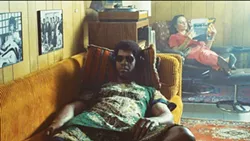
HBO’s Winning Time and Tokyo Vice
The editor suggested, due to some fairly horrific recent events, that I keep this week’s selection light, perhaps write a column about comfort viewing. I may have met her halfway. There are certainly times when I seek out broad comedy to soothe my beleaguered psyche. As previously (repeatedly) mentioned, my wife and I spent the early months of the pandemic revisiting our DVD collection — yes, we still have one of those — to enjoy a simple laugh in the face of the apparent impending collapse of society. We screened Wet Hot American Summer (2001), Wedding Crashers (2005) and most of the movies bearing the Apatow or McKay imprint, with mostly delightful, restorative results. When I’m alone, though, and in the depths of some usually self-induced trauma pit, I tend toward thematically darker, generally brooding, almost always violent fare. There have been dark afternoons with Apocalypse Now (1979) and a bottle of Bourbon, and not infrequent late nights/early mornings scored by Michael Mann battle sequences. And so, this week, in search of succor and in the pursuit of something fresh in the absence of a particularly compelling new movie, I looked to prestige TV; everybody seems to think it’s the new cinema anyway. HBO may or may not have invented the medium, but it is difficult to deny the network has done more work than any other institution to perfect, streamline and (I’m loath to use the phrase) platform it. The Wire and The Sopranos and Oz are more significant cultural touchstones than almost any movie or novel or other work of art in the last two decades. And, yes, people seem to love Game of Thrones. The advent of streaming and the audience’s increased acceptance of long-form storytelling has allowed television series of a certain tier to continue to evolve and advance. While the complaint has been levied in the past that TV is a writer’s medium, one that diminishes the role of the director and the visual design of a show, I would counter that there may be more artistic freedom, more invention and more definitive style in some of these series than in the vast majority of movies. WINNING TIME: THE RISE OF THE LAKERS DYNASTY, created by Max Borenstein and Jim Hecht, with a pilot episode directed by Adam McKay, tells the story of the transformation of the LA Lakers franchise — and of the National…

